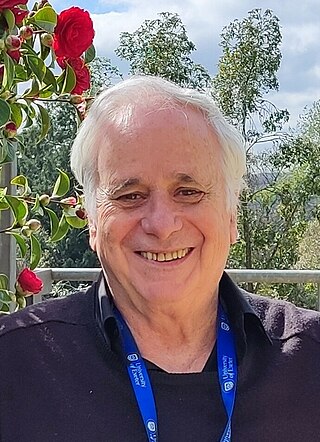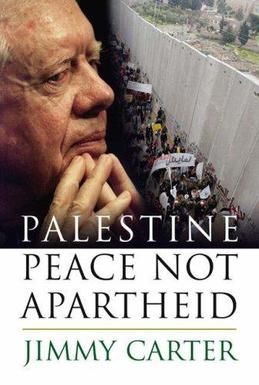
The West Bank, so called due to its location relative to the Jordan River, is the larger of the two Palestinian territories. A landlocked territory near the coast of the Mediterranean Sea in the Levant region of West Asia, it is bordered by Jordan and the Dead Sea to the east and by Israel to the south, west, and north. The territory has been under Israeli occupation since 1967.

Ethnic cleansing is the systematic forced removal of ethnic, racial, or religious groups from a given area, with the intent of making the society ethnically homogeneous. Along with direct removal such as deportation or population transfer, it also includes indirect methods aimed at forced migration by coercing the victim group to flee and preventing its return, such as murder, rape, and property destruction. Both the definition and charge of ethnic cleansing is often disputed, with some researchers including and others excluding coercive assimilation or mass killings as a means of depopulating an area of a particular group.

The Palestinian territories are the two regions of the former British Mandate for Palestine that have been occupied by Israel since the Six-Day War of 1967, namely the West Bank and the Gaza Strip. The International Court of Justice (ICJ) has referred to the West Bank, including East Jerusalem, as "the Occupied Palestinian Territory", and this term was used as the legal definition by the ICJ in its advisory opinion of July 2004. The term occupied Palestinian territory was used by the United Nations and other international organizations between October 1999 and December 2012 to refer to areas controlled by the Palestinian National Authority, but from 2012, when Palestine was admitted as one of its non-member observer states, the United Nations started using exclusively the name State of Palestine. The European Union (EU) also uses the term "occupied Palestinian territory". The government of Israel and its supporters use the label "disputed territories" instead.

Israelis are the citizens and nationals of the State of Israel. The country's populace is composed primarily of Jews and Arabs, who respectively account for 75 percent and 20 percent of the national figure; followed by other ethnic and religious minorities, who account for 5 percent.

Benny Morris is an Israeli historian. He was a professor of history in the Middle East Studies department of Ben-Gurion University of the Negev in the city of Beersheba, Israel. Morris was initially associated with the group of Israeli historians known as the "New Historians", a term he coined to describe himself and historians Avi Shlaim, Ilan Pappé and Simha Flapan. Scholars have perceived an ideological shift in Morris's work and a departure from the critical scholarship of his New Historian colleagues starting around 2000 during the Second Intifada.

Kevin B. MacDonald is an American antisemitic conspiracy theorist, white supremacist, and retired professor of evolutionary psychology at California State University, Long Beach (CSULB). In 2008, the CSULB academic senate voted to disassociate itself from MacDonald's work.

Ethnocide is the extermination or destruction of cultures.

American Jews or Jewish Americans are American citizens who are Jewish, whether by culture, ethnicity, or religion. According to a 2020 poll conducted by Pew Research, approximately two thirds of American Jews identify as Ashkenazi, 3% identify as Sephardic, and 1% identify as Mizrahi. An additional 6% identify as some combination of the three categories.

The Bosnian genocide refers to both the Srebrenica massacre and the wider crimes against humanity and ethnic cleansing campaign throughout areas controlled by the Army of Republika Srpska (VRS) during the Bosnian War of 1992–1995. The events in Srebrenica in 1995 included the killing of more than 8000 Bosniak men and boys, as well as the mass expulsion of another 25000–30000 Bosniak civilians by VRS units under the command of General Ratko Mladić.

Ilan Pappé is an Israeli historian, political scientist, and former politician. He is a professor with the College of Social Sciences and International Studies at the University of Exeter in the United Kingdom, director of the university's European Centre for Palestine Studies, and co-director of the Exeter Centre for Ethno-Political Studies. Pappé was also a board member of the Israeli political party Hadash, and was a candidate on the party list in the 1996 and 1999 Israeli legislative elections.

Israel's policies and actions in its ongoing occupation and administration of the Palestinian territories have drawn accusations that it is committing the crime of apartheid. Leading Palestinian, Israeli and international human rights groups have said that the totality and severity of the human rights violations against the Palestinian population in the occupied territories, and by some in Israel proper, amount to the crime against humanity of apartheid. Israel and some of its Western allies have rejected the accusation. Israel often calls the charge antisemitic, which critics have called a weaponization of antisemitism.

The book Palestine: Peace Not Apartheid by former president Jimmy Carter has been highly controversial and attracted a wide range of commentary. The reception of the book has itself raised further controversy, occasioning Carter's own subsequent responses to such criticism.
Antisemitism in contemporary Norway deals with antisemitic incidents and attitudes encountered by Jews, either individually or collectively, in Norway since World War II. The mainstream Norwegian political environment has strongly adopted a platform that rejects antisemitism. However, individuals may privately hold antisemitic views. Currently, there are about 1,400 Jews in Norway, in a population of 5.3 million.

Edward Wadie Said was a Palestinian-American philosopher, academic, literary critic, and political activist. As a professor of literature at Columbia University, he was among the founders of post-colonial studies. As a cultural critic, Said is best known for his book Orientalism (1978), a foundational text which critiques the cultural representations that are the bases of Orientalism—how the Western world perceives the Orient. His model of textual analysis transformed the academic discourse of researchers in literary theory, literary criticism, and Middle Eastern studies.
In the 1948 Palestine war, more than 700,000 Palestinian Arabs – about half of Mandatory Palestine's predominantly Arab population – were expelled or fled from their homes, at first by Zionist paramilitaries, and after the establishment of Israel, by its military. The expulsion and flight was a central component of the fracturing, dispossession, and displacement of Palestinian society, known as the Nakba. Dozens of massacres targeting Arabs were conducted by Israeli military forces and between 400 and 600 Palestinian villages were destroyed. Village wells were poisoned in a biological warfare programme and properties were looted to prevent Palestinian refugees from returning. Other sites were subject to Hebraization of Palestinian place names.

The Oslo Accords are a pair of interim agreements between Israel and the Palestine Liberation Organization (PLO): the Oslo I Accord, signed in Washington, D.C., in 1993; and the Oslo II Accord, signed in Taba, Egypt, in 1995. They marked the start of the Oslo process, a peace process aimed at achieving a peace treaty based on Resolution 242 and Resolution 338 of the United Nations Security Council. The Oslo process began after secret negotiations in Oslo, Norway, resulting in both the recognition of Israel by the PLO and the recognition by Israel of the PLO as the representative of the Palestinian people and as a partner in bilateral negotiations.

The Ethnic Cleansing of Palestine is a book authored by New Historian Ilan Pappé and published in 2006 by Oneworld Publications. The book is about the 1948 Palestinian expulsion and flight, which Pappe argues was the result of ethnic cleansing.

The Israeli Committee Against House Demolitions (ICAHD) is a group opposed to Israeli settlements, which describes itself as "an Israeli peace and human rights organization dedicated to ending the occupation of the Palestinian territories and achieving a just peace between Israelis and Palestinians."

Boycotts of Israel are the refusal and calls to refusal of having commercial or social dealings with Israel in order to influence Israel's practices and policies by means of using economic pressure. The specific objective of Israel boycotts varies; the Boycott, Divestment and Sanctions (BDS) movement calls for boycotts of Israel "until it meets its obligations under international law", and the purpose of the Arab League's boycott of Israel was to prevent Arab states and others to contribute to Israel's economy. Israeli officials have characterized the BDS movement as antisemitic.
The current campaign for an academic boycott of Israel was launched in April 2004 by the Palestinian Campaign for the Academic and Cultural Boycott of Israel (PACBI) as part of the Boycott, Divestment and Sanctions (BDS) campaign. The campaign calls for BDS activities against Israel to put international pressure on Israel, in this case against Israeli academic institutions, all of which are said by PACBI to be implicated in the perpetuation of Israeli occupation, in order to achieve BDS goals. Since then, proposals for academic boycotts of particular Israeli universities and academics have been made by academics and organisations in Palestine, the United States, the United Kingdom, and other countries. The goal of the proposed academic boycotts is to isolate Israel in order to force a change in Israel's policies towards the Palestinians, which proponents argue are discriminatory and oppressive, including oppressing the academic freedom of Palestinians.
















